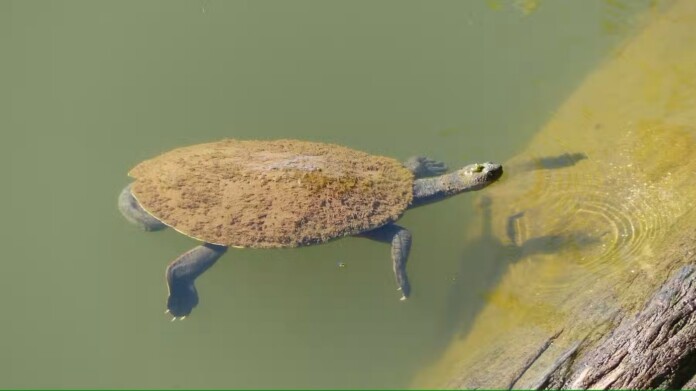Australia is home to a diverse array of wildlife, but few creatures rival the uniqueness of the Mary River turtle, once on the brink of extinction. Thanks to the efforts of 800 residents in Tiaro, the turtle is making a comeback in its namesake river, marking a significant conservation success for the town and the nation.
The Mary River turtle, scientifically known as Elusor macrurus, affectionately dubbed the “Bum-breathing punk,” possesses a remarkable evolutionary adaptation—it breathes through its cloaca, enabling it to remain submerged for up to three days without resurfacing.
As one of Australia’s largest turtle species, the Mary River turtle can weigh nearly 20 pounds and measure up to 20 inches from nose to tail. Its distinctive appearance, often likened to a punk rocker with a dyed-green mohawk, is due to algae accumulation on its head and shell.
Another standout feature of the Mary River turtle is its tail, which possesses haemal arches, a bony structure typically associated with sauropod dinosaurs and lost in other modern turtles, making it a unique specimen in contemporary evolution.
This species, endemic to the Mary River and its five tributaries in southeast Queensland, faced imminent extinction due to egg poaching for the pet trade, with the eggs falsely marketed as ‘penny turtles.’ However, since 2001, the community of Tiaro has spearheaded a conservation program aimed at safeguarding turtle nests and eggs in their natural habitat.
During nesting season, dedicated volunteers diligently locate and fence off nesting sites, shielding them from threats like livestock and egg predators such as foxes. This grassroots initiative has played a pivotal role in the Mary River turtle’s remarkable recovery, showcasing the power of local communities in preserving Australia’s unique biodiversity.
The recent scientific analysis has revealed the multifaceted success of the turtle conservation program in Tiaro. Not only has it led to an increase in the number of Mary River turtles and improved hatchling survival rates, but it has also generated a wealth of valuable scientific data, thanks to the diligent efforts of the local community.
However, this success was not achieved overnight. The town embarked on innovative fundraising initiatives, such as selling homemade chocolate turtles, to finance scholarships for students interested in studying turtle conservation at university and to acquire essential research equipment. These efforts underscore the community’s commitment to preserving their unique ecosystem.
In 2006, photographer Chris Van Wyk captured captivating images of the Mary River turtle’s distinctive green ‘hair,’ which garnered widespread attention and raised awareness about the species. This viral sensation further fueled public support for conservation efforts.
While the Mary River turtle remains endangered, the concerted efforts of Tiaro’s residents have yielded remarkable results. Not only have turtle populations rebounded, but the community’s research endeavors have also informed the development of protocols for local water resource management and strategic planning. These protocols prioritize the protection of the watershed and habitat crucial for the turtle’s survival, ensuring that conservation considerations are integrated into decision-making processes.
